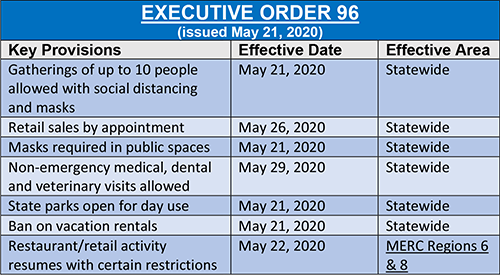Court sides with governor on emergency powers in 1945 law
 Michigan’s Court of Claims turned aside a challenge to Gov. Gretchen Whitmer’s emergency powers under a 1945 state law in a ruling issued Thursday.
Michigan’s Court of Claims turned aside a challenge to Gov. Gretchen Whitmer’s emergency powers under a 1945 state law in a ruling issued Thursday.
Judge Cynthia Stephens rejected the challenge by House Speaker Lee Chatfield (R-Emmet) and Senate Majority Leader Mike Shirkey (R-Jackson) that the governor had exceeded her powers.
“It would take a particularly strained reading of the plain text of the (law) to conclude that a grant of authority to deal with a public crisis that affects all the people of this state would somehow be constrained to a certain locality,” Stephens said.
However, Stephens did rule that the governor cannot use a 1976 law to “unilaterally make emergency declarations,” the Associated Press reported. Whitmer had issued emergency orders under both the 1945 and 1976 statutes after the Legislature had declined to extend a state of emergency in late April.
Legislative leaders said they will appeal the decision.
In the meantime, all the governor’s executive orders remain in force.
For more information on this issue, contact Deena Bosworth at bosworth@micounties.org.
Podcast 83 delves into federal aid prospects, state budget crisis
 Aid proposals for counties and others continue to float around Capitol Hill, while the state of Michigan has nothing but grim budget news for the next two years, said MAC staffers during the most recent episode of Podcast 83, MAC’s audio briefing on all news and policies related to counties.
Aid proposals for counties and others continue to float around Capitol Hill, while the state of Michigan has nothing but grim budget news for the next two years, said MAC staffers during the most recent episode of Podcast 83, MAC’s audio briefing on all news and policies related to counties.
Also discussed was the decision this week by Gov. Gretchen Whitmer to revise her Stay at Home order for northern regions of Michigan: “Restaurants and bars can open, but at half capacity, and again protocols are just like the rest of the industries that have gone back to work,” explained Deena Bosworth, MAC’s governmental affairs director. “This is all just in time for Memorial Weekend. It’s probably really good news for those Up North.”
On Capitol Hill, said Executive Director Stephan Currie, numerous proposals are in play that would send more rescue funds to Michigan, but they are not all the same: “I think it’s important to note that when you look at the two packages, HEROES vs. SMART, HEROES does provide a lot of flexibility, where SMART does kind of put some guardrails on there, which I think we’re comfortable with going forward. We understand people should not be making pension payments and things like that. This is not just bailout funds. These are funds used to deal with direct revenue loss because of COVID-19.”
Less encouraging was the report from the Consensus Revenue Estimating Conference that Michigan is in the hole about $6 billion over the rest of this budget year (FY20) and the next (FY21).
“It takes three to tango,” said Keit, regarding the prickly relationship among Gov. Whitmer, House Speaker Lee Chatfield (R-Emmet) and Senate Majority Leader Mike Shirkey (R-Jackson) that must be navigated if budget compromises are to be found in Lansing.
To hear the new episode, or listen to prior ones, visit the Podcast 83 page.
New order loosens restrictions on retail activity, social gatherings

Locals would gain spending flexibility on roads under House bills
 Local road agencies could reallocate their share of state road funding dollars to the roads they determine need it the most under two bills approved by the House this week.
Local road agencies could reallocate their share of state road funding dollars to the roads they determine need it the most under two bills approved by the House this week.
Current law dictates that 75% percent of the money must be spent on primary roads, leaving only 25 percent for secondary roads. But House Bill 4965, by Rep. Rodney Wakeman (R-Saginaw), and HB 4966, by Rep. Andrea Schroeder (R-Oakland), eliminate the requirements to allocate the funding in a 75/25 split.
This comes in the wake of new asset management plan requirements that created asset mapping. The maps, approved by the State Transportation Asset Management Council, identify the conditions of roads and rank them. The flexibility will allow locals to allocate their resources in a manner consistent with need, instead of restricting the funds according to percentages.
MAC supports both bills, which now move to the Senate.
For more information on this issue, contact Deena Bosworth at bosworth@micounties.org.
Immunity bill stalls in committee; Whitmer issues new EO on nursing homes
 A bill to provide civil and criminal immunity to health providers during the coronavirus crisis got its second hearing this week before the House Judiciary Committee.
A bill to provide civil and criminal immunity to health providers during the coronavirus crisis got its second hearing this week before the House Judiciary Committee.
Senate Bill 899, by Sen. Michael MacDonald (R-Macomb) was held over, however, after several committee members voiced concern with the language that provides immunity due to a shortage of PPE and the time frame that runs to Sept. 30, even if Michigan is not then under a State of Emergency.
The bill sponsor and committee members continue to work on potential amendments to the bill.
In other medical news, the governor issued Executive Order 95, rescinding last week’s EO 84 and extending enhanced protections for the health and safety of residents and employees of long-term care facilities. The order took effect immediately and will run through June 17.
The order came shortly after criticism by the Republican majority in the Senate Oversight Committee of the governor’s executive orders relating to nursing homes and safety concerns over admitting or readmitting patients who had previously tested positive for COVID-19.
The new order “…-95 provides for a holistic decision-making process so that COVID-19-affected residents will only be discharged from a hospital to a facility that is capable of safely isolating the resident. In doing so, the order requires all hospital discharges be made consistent with current CDC and DHHS guidance. To ensure residents and employees are receiving the protections it affords, Executive Order 2020-95 authorizes the Department of Licensing and Regulatory Affairs (LARA) to take actions necessary to assure the proper level of care and services in connection with this order.”
For more information on this issue, contact Meghann Keit at keit@micounties.org.
NACo cancels 2020 Annual Conference planned for July
 The National Association of Counties (NACo) will not hold its 2020 Annual Conference in July, the group’s board announced this week. Instead, the group will proceed with a virtual Annual Business Meeting, including the election for second vice president, consideration of by-laws amendments and other association business.
The National Association of Counties (NACo) will not hold its 2020 Annual Conference in July, the group’s board announced this week. Instead, the group will proceed with a virtual Annual Business Meeting, including the election for second vice president, consideration of by-laws amendments and other association business.
The 2020 NACo Annual Business Meeting will be on Monday, July 20 at 2 p.m. on a secure online platform with the ability of NACo members to vote in accordance with NACo by-laws. Participation will be free for all NACo members, but registration is required. Click here to register for the virtual Annual Business Meeting. Voting delegates must complete the credentials form as part of this registration process.
If you are not sure if your county is a NACo member, contact NACo’s John Losh at jlosh@naco.org.
In addition, NACo is planning a virtual membership town hall meeting on Monday, July 13 at 4 p.m. that will include: a forum for second vice president candidates; an overview of proposed by-laws amendments; a status report on voting delegate credentials totals; and a Review of NACo policy resolutions.
Rural communities can get federal grants to fight opioid abuse
 Rural communities can apply for grants from a $12 million fund to fight opioid abuse under the Rural Communities Opioid Response Program (R-CORP), the federal Health Resources and Services Administration (HRSA) announced on May 13.
Rural communities can apply for grants from a $12 million fund to fight opioid abuse under the Rural Communities Opioid Response Program (R-CORP), the federal Health Resources and Services Administration (HRSA) announced on May 13.
The grant will support the expansion of prevention, treatment and recovery services for opioid and other substance use disorders.
To be eligible, the applicant must serve rural communities at the highest risk for substance use disorder. Rural counties and counties serving rural census tracts within the county are eligible to apply.
Program applications are due by July 13 and HRSA is expected to disburse funding by Sept. 1. Grant funding may be used to support the following activities, many of which fulfill county priorities in addressing substance use disorders in our communities:
- Distributing naloxone to individuals and organizations;
- Providing community-based naloxone training;
- Recruiting and training providers and support staff in medication assisted treatment (NOTE: These grant funds cannot be used to pay providers/support staff to deliver medication assisted treatment);
- Creating a strategy to reach and engage individuals at high risk of substance use disorders (SUD) or opioid use disorders (OUD);
- Working with law enforcement to develop a diversion program; and
- Training providers, administrative staff and other relevant stakeholders to optimize reimbursement for treatment encounters through proper coding and billing.
Webinar will aid government leaders in rethinking operations
 County leaders are invited to a June 5 webinar on how to evaluate operations and adapt them to current needs.
County leaders are invited to a June 5 webinar on how to evaluate operations and adapt them to current needs.
Leaders across all industries and sectors are currently figuring out how to navigate priorities, customer needs and business operations during the unfolding coronavirus pandemic. Defining a short-term strategy to lead your organization through this health crisis takes resourcefulness, flexibility, a clear vision and the ability to ask yourself some big questions. It’s been proven time and again that the best strategies are built on good information.
Click here to register for this free event, from 1 p.m. to 1:30 p.m., put on by the Lansing firm of Public Sector Consultants, Inc.
 Staff picks
Staff picks
- A legal perspective on reopening communities (International City/County Management Association)
- How states pay for natural disasters in an era of rising costs (Pew Trusts)
- The local budget crisis: One way of sharing the burden (W.E. Upjohn Institute for Employment Research)
- Why do some COVID-19 patients infect many others, whereas most don’t spread virus at all? (Science magazine)
